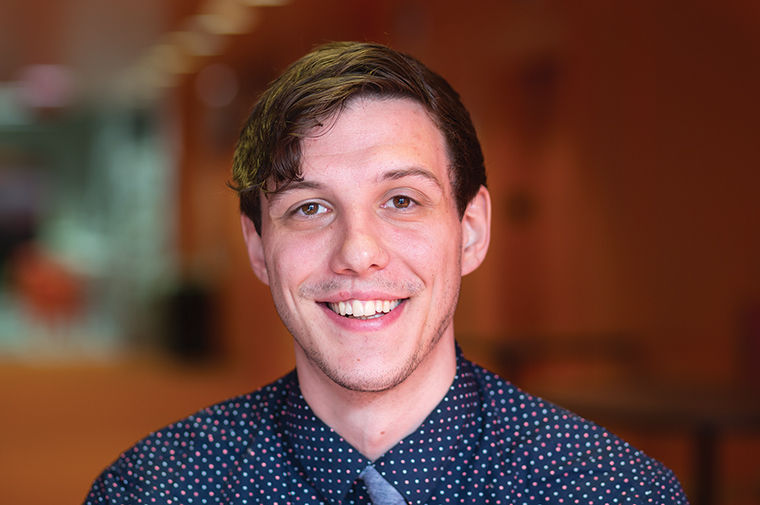Student nationally recognized for eco-friendly project
Filip Zadro, a senior audio arts & acoustics major from Croatia, created a project that aims to deliver access to clean water in parts of the world that struggle with finding pure water sources.
March 30, 2015
After a year of intense planning, expansive research, in-depth storyboarding and building a web of global contacts, Filip Zadro, a senior audio arts & acoustics major from Croatia, has been selected to represent Columbia at the Clinton Global Initiative University (CGIU).
CGIU, which was hosted in Miami from March 6–8, is a selective, invitation-only annual conference. CGIU invites people from national and international colleges and universities. Attendees make a “commitment to action,” or a promise to develop their projects and past the drawing board and into reality.
Projects focus on solutions to pressing global challenges such as education, environment and climate change, peace and human rights, poverty alleviation and public health.
Without any formal engineering training and only a standard understanding of mathematics, Zadro created a nationally recognized, eco-friendly project concentrating on poverty reduction in villages.
“In the next few years, people will still be talking about what countries we should help or how many people died from simple, avoidable airborne illnesses,” Zadro said. “So while they are contemplating that, I can be on the ground and prove that it doesn’t take that much to get something like this implemented.”
Zadro said he was inspired to plan his own project when his brother, a junior environmental economics and policies major at Michigan State University, was accepted into the program in 2013.
Coming from an eco-friendly family, Zadro said he wanted to help communities that lack consistent access to clean water and energy, a problem that today’s technology can address across the globe.
His goal is to provide poverty-ridden areas with a system that will allow the community to clean and filter the local water they gather and will generate enough electricity to power the daily lives of nearly one thousand people. He also created the “building block,” which contains a low-energy computer used for communication so communities with the container can reach medical personnel and receive data packets to teach community children.
The resources generated by the building block will give the community a chance to form a microeconomic system. Once the system is installed, the empty interior of the block can be used as a school for the local children or as a clean room for women to give birth.
“I feel what helped me stand out is that I knew I wanted to help,” Zadro said. “I knew the realities of what people are going through in different parts of the world.”
Zadro worked with David Morton, director of the Visualization Lab where students can produce 2D and 3D projects, to help develop his initial idea.
Morton said Zadro did not require a lot of help or encouragement because he believed fully in what he wanted to achieve.
“He doesn’t just talk about things, he actually does things,” Morton said.
Zadro is vice president of the International Student organization, where he works with students to plan festivals, musical performances and art showcases.
He also works with Marcelo Caplan, an associate professor in the Science & Mathematics Department, to help educate the community in the curriculum of science, technology, engineering and mathematics through the STEM program.
Caplan became Zadro’s support system throughout the process by allowing Zadro an environment to grow and flourish.
“I was supporting him, but he is the artist of all this work,” Caplan said. “He was the leader and he was the mastermind.”
Caplan helped him consult with other professionals, investigate further into the project and help calculate what level of electricity is needed to generate the building block on a daily basis among other tasks.
“I am so proud of him that he has a future, sees the future and moves toward the future, not because it’s part of the plan, but because it is his passion to be an excellent professional,” Caplan said.
At the conference, Zadro met students from universities such as Yale, Harvard and Cornell and said it was fantastic being able to tap into lots of different people.
He said he has not hit his proudest moment yet, but he was happy to see the project received with such open arms at the CGIU conference.
“It gave me a sense of accomplishment and sort of a sense of relief to know I didn’t waste a year of my time to have the bubble burst on me,” Zadro said.
The project is currently still in the engineering process and Zadro said he hopes to start the building procedure soon. He said he plans to have the first unit on the ground in Rwanda in early 2017.
In the meantime, Zadro plans to pursue his master’s degree in environmental policies and economics or ideology. He then hopes to turn it into a Ph.D. in a similar field.
“I would like to see more students take risks and explore things that are beyond the frame that they are putting to themselves,” Caplan said. “That is what Filip is all about.”








